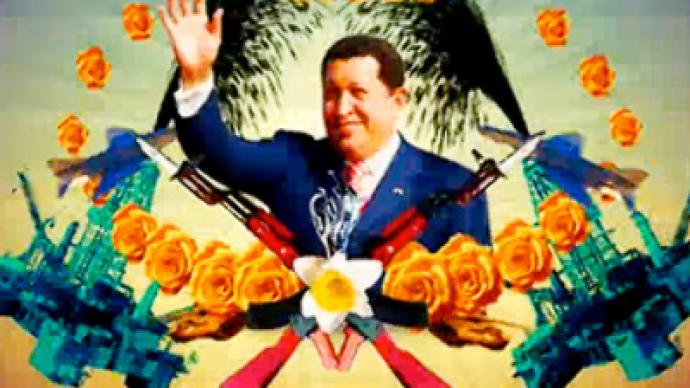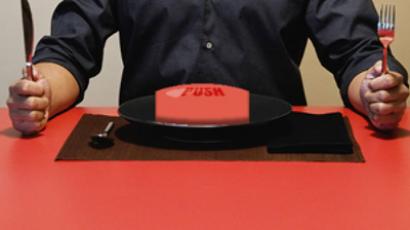Hugo Chavez gives America a piece of his mind

Venezuelan President Hugo Chavez called US officials "stupid" on Thursday for criticizing his recent shopping spree of Russian-made military hardware, saying it is for defensive purposes.
As the United States bears down on the Venezuelan leader for stockpiling Russian-made weapons, the verbal fireworks display is beginning to get explosive.
"Yesterday (Wednesday) the Secretary of State of the empire was in Bogotá, hurling his darts at Venezuela and some make it easer for the empire by saying that there are concerns in the United States because Venezuela is buying plenty of weapons," Chávez said.
Chavez was apparently making reference to comments by Arturo Valenzuela, US Assistant Secretary of State for Western Hemisphere Affairs, who was speaking in Bogotá during a week-long trip to Ecuador, Colombia and Peru.
"Don't be so stupid, Yankees!" the Venezuelan leader exclaimed at a ceremony to mark the delivery of patrol boats purchased from Spain, a deal that comes on the heels of a major arms agreement with Russia.
Following a visit to Venezuela last week, Prime Minister Vladimir Putin said sales of weapons to Venezuela "could exceed $5 billion," and may include dozens of T-72 tanks and S-300 advanced anti-aircraft missiles, RIA Novosti reported.
According to Russian military sources, Venezuela’s latest order of Russian-made military hardware include three diesel submarines, 92 T-72 tanks, dozens of BMP-2 armored vehicles, 10 Mi-28N helicopters, reconnaissance aircraft, rocket launchers and air defense systems.
The South American country has already spent a whopping $4.4 billion on Russian equipment – including the Sukhoi-30 fighter, helicopters, and thousands of Kalshnikov AK-47 assault rifles – bringing Chavez’s total bill to $9.4 billion, which far exceeds the $2.2 billion loan that Russian awarded him last year for weapons purchases.
In addition to lavish Russian purchases, Caracas is also buying weapons from other nations, and just recently sealed a deal with the Chinese for 18 K-8 jets and radar systems. Thus, analysts fear that Venezuela’s appetite for military hardware may fuel regional problems in America’s geopolitical backyard.
Washington accuses Chavez, who has good relations with Cuba and Iran, of aggravating an arms race in the region where other nations, like Colombia and Bolivia, are beginning to beef up their militaries as well.
"We're hard-pressed to see what legitimate defense needs Venezuela has for this equipment," US State spokesman P.J. Crowley said. "If Venezuela is going to increase its military hardware, we certainly don't want to see this hardware migrate to other parts of the hemisphere."
A Russian tit-for-tat?
Hugo Chavez insists that he is simply replacing obsolete equipment, as well as defending his country against possible attacks from Colombia and the United States. Venezuela has been fiercely critical of a security agreement between America and Colombia, which allows US personnel access to military bases in a country that is part of America’s ongoing “war on drugs” program.
Back in 2005, Venezuela and the United States made an attempt to work together in a drug-busting operation, which, instead of mending ties, only served to increase Chavez’s suspicion's over the true intentions of Venezuela's “imperial” neighbor to the north.
"The DEA was using the fight against drug trafficking as a mask, to support drug trafficking, to carry out intelligence in Venezuela against the government," Chavez said. "We have detected intelligence infiltration that threatened national security and defense."
Chavez has also accused the US government of supporting a brief coup against him in 2002; US officials dismissed the accusations as “ridiculous.”
Finally, Iran's President Mahmoud Ahmadinejad in December paid a visit to Brazil, Venezuela and Bolivia, where he voiced Iran's right to a nuclear program.
The trip triggered a stern warning from Washington.
"I think if people want to flirt with Iran, they should take a look at what the consequences might well be for them,” US Secretary of State Hillary Clinton said. “And we hope that they will think twice and we will support them if they do."
This hostile atmosphere between Caracas and Washington has allowed Moscow to give the United States a taste of its own bitter medicine, which it has been dumping rather liberally in Russia’s geopolitical backyard since the collapse of the Soviet Union.
Although things suddenly look more upbeat for the US-Russian relationship, especially with Presidents Barack Obama and Dmitry Medvedev putting their signatures to a new START treaty, Washington’s determination to place a missile defense system in Romania is a move that Moscow will not easily forgive and forget.
Although Russian military analysts are unanimous in the belief that Russian Kalashnikovs and tanks in Venezuela is in no way comparable to a sophisticated missile defense shield in Eastern Europe, it will nevertheless force the United States to consider the consequences of their unilateral actions in a world that is increasingly becoming multilateral.
Whatever the case may be, as long as Venezuela continues to have oil to sell, and America continues to flex its muscles far from home, Russia will continue to have a valuable customer for its defensive weapons on the South American continent.













